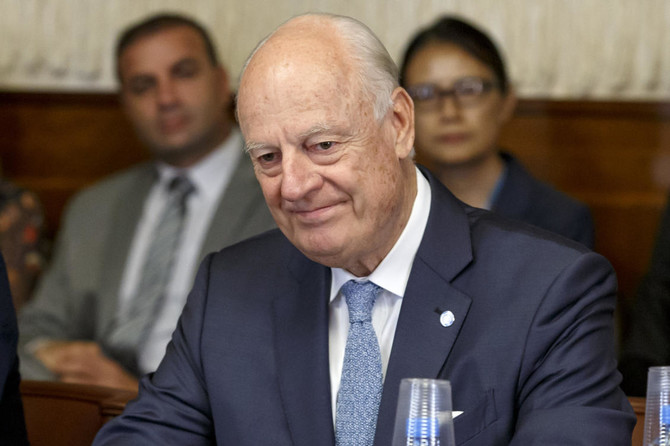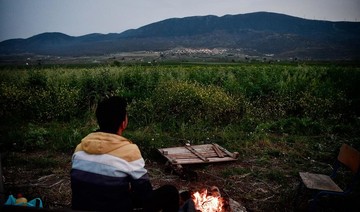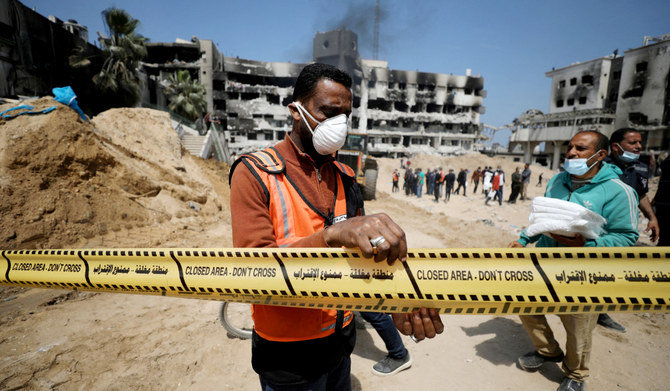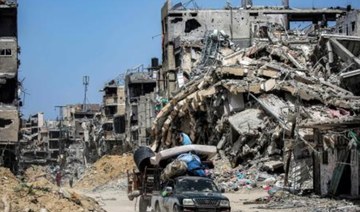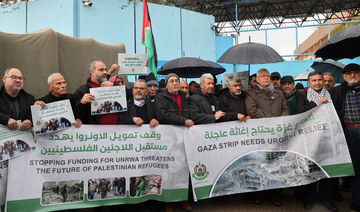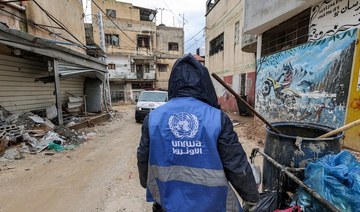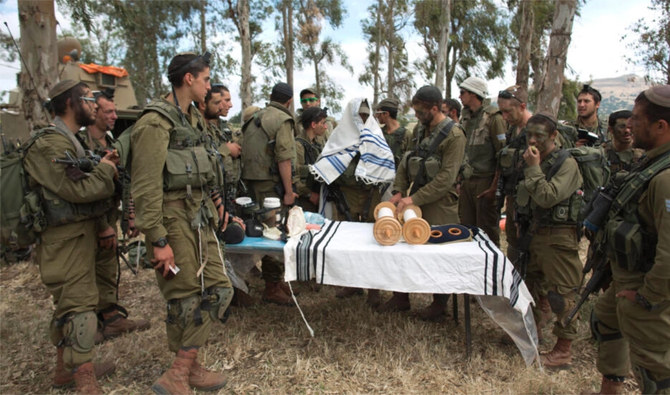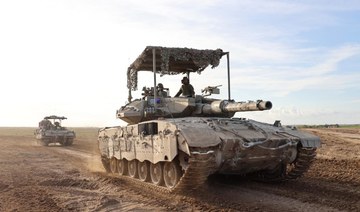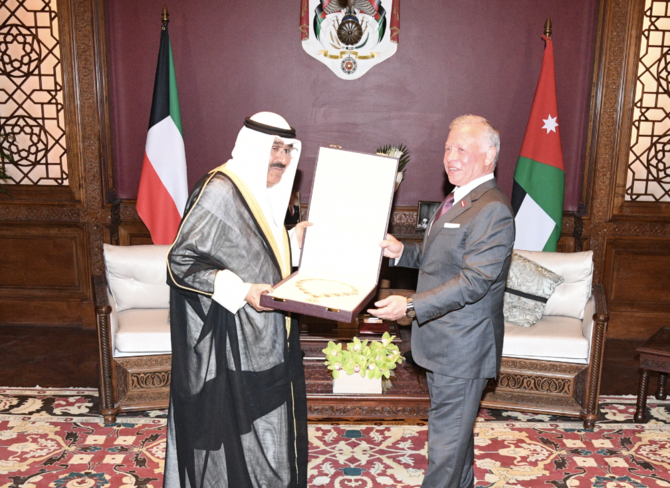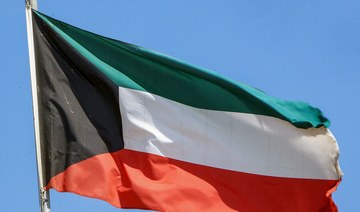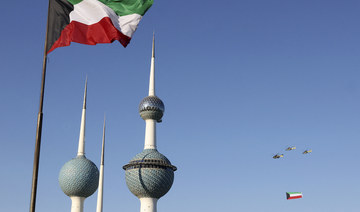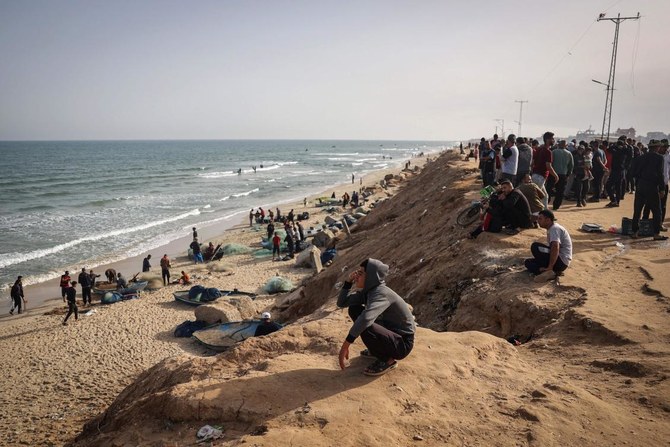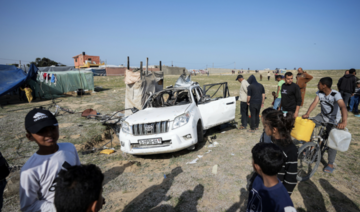GENEVA: When your job has been labelled “mission impossible,” failure may be the most likely outcome.
There is no doubt that the United Nations Special Envoy for Syria, Staffan de Mistura, has persevered through extraordinary challenges during four-and-half years in the role.
But as the UN peace drive has dragged on without evident success, Syrian President Bashar Assad’s forces have steadily gained ground, pinning the opposition into their last bastion of Idlib while showing little interest in negotiating an end to the bloodshed.
De Mistura has meanwhile been criticized for doing anything necessary to keep the UN talks alive while letting them devolve into negotiations without substance.
The veteran diplomat’s defenders applaud his flexibility and creativity while facing an obstinate Assad regime.
But questions have mounted over the future of the UN peace effort, with this week’s General Assembly serving as yet another deadline missed, while France warned Monday a “perpetual war” loomed in the Middle East unless a Syrian peace accord is reached.
De Mistura briefed the Security Council last week about his faltering bid to create a committee to revise Syria’s constitution, a project conceived at separate negotiations in Sochi led by Iran, Russia and Turkey.
He had voiced hope the committee would be agreed before the General Assembly, where the Syrian conflict that has killed more than 360,000 people since 2011 will top the agenda.
But for Emile Hokayem, senior Middle East fellow at the International Institute for Strategic Studies, trying to create the committee is “motion without movement” that will not help Syrian reconciliation.
“It’s a waste of jet fuel and diplomatic credibility. This is something that is obviously not relevant at all.”
De Mistura told the Security Council the government and opposition had not yet agreed on the makeup of the committee.
The actual work of revising Syria’s constitution therefore does not appear imminent, while the UN’s broader mandate of negotiating “political transition” in Damascus appears to be on the backburner.
De Mistura warned the Security Council that endless “consulting” had risks. He later told reporters that next month he might be able to discuss “what could be the beginning of the constitutional committee.”
For Hokayem, the constitutional project is an example of a chronic problem with the Geneva process, where diplomatic targets keep shifting in the absence of achievement.
Throughout, Assad has been able to nominally claim he is participating in UN talks while pressing a military campaign.
“The UN should be reflecting first about whether this is worth the effort... and, more importantly, whether they are serving the Syrian people at all,” Hokayem said.
“We never get a sense from de Mistura that enough is enough.”
A European diplomat, who requested anonymity, praised de Mistura for believing in “the art of the possible” and using the constitutional committee “as a mechanism that potentially breaks a log jam.”
But he also warned that endlessly extending the dialogue was dangerous.
“The suspicion of course that many of us have, including me, is that the regime and its backers simply want to play this along, that it’s just a talking shop, so we must be clear that that can’t happen,” he said.
In an email to AFP, de Mistura’s office defended the constitutional reform effort as “an important milestone itself and viable entry point for other reforms to come,” including UN-supervised elections, a key plank of the Geneva process.
For David Harland, the director of the Center for Humanitarian Dialogue, de Mistura’s missteps are an extension of the UN’s broader decline as a peacebroker.
Harland’s criticisms are not strictly those of an outsider: UN Secretary General Antonio Guterres named him to a special advisory group on conflict mediation.
In the two decades following the end of the Cold War, when permanent Security Council members were less bitterly divided, Harland credited the UN with playing a central role in striking deals to end several conflicts, including Iran-Iraq, Guatemala, Cambodia and Lebanon, among others.
Since 2008, the UN’s peacemaking record has largely been defined by failure, Harland argued in a paper presented at the Oslo Security Forum.
There are many reasons why — like an increasingly dysfunctional Security Council — but some are internal UN shortcomings evident in de Mistura’s mandate, Harland argued.
One example is a lack of agility.
“Prior to the mid-1990s, UN envoys were usually supported by a small personal staff,” whereas they have lately expanded into larger “special political missions,... including advisers dedicated to everything from gender equality to the demobilization of child soldiers.”
De Mistura, who habitually references the importance of his “women’s advisory board,” has a staff of 92, his office said, listing its total budget over the past three years at approximately $50 million.


